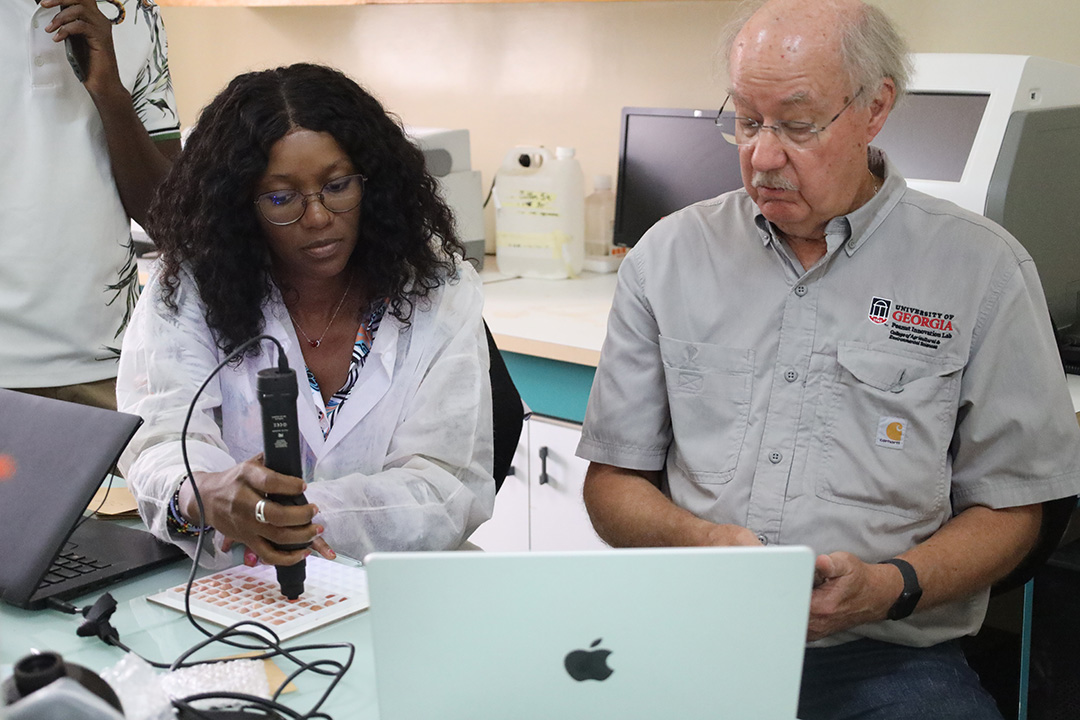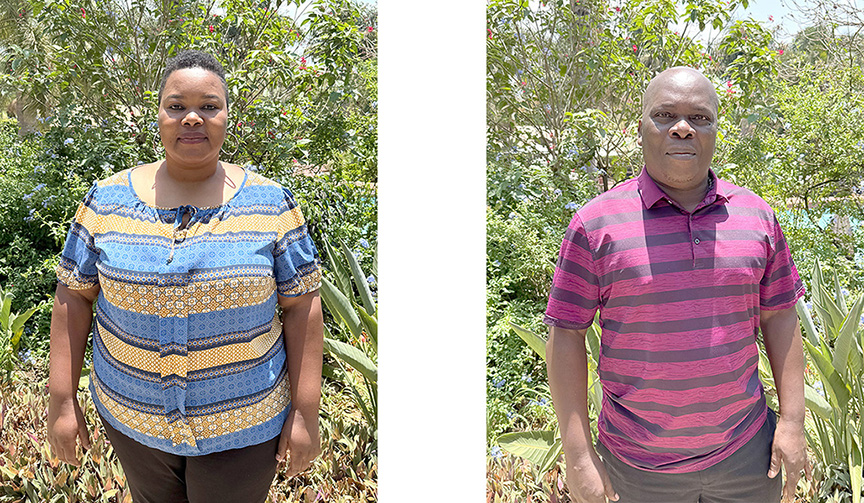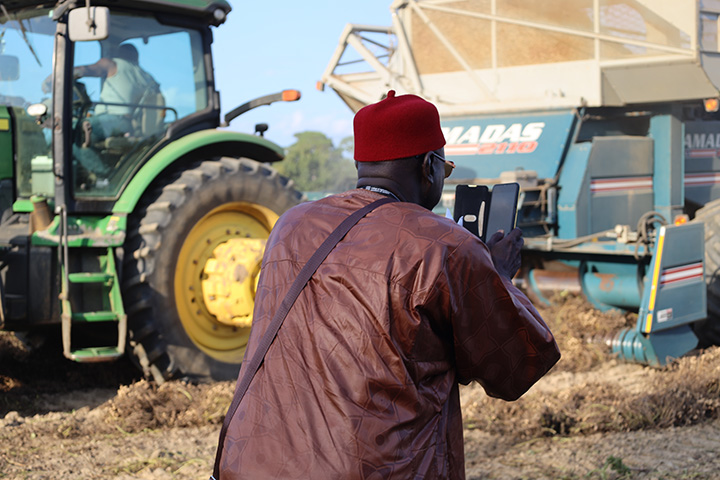A partnership between the Feed the Future Innovation Lab for Peanut and Southern African Farmer-to-Farmer (F2F) program brought innovation and capacity-building to scale, training 3,636 farmers in groundnut production and aflatoxin control, including 2,245 women and 363 youth.
Through the collaboration – which was built on the strengths of both parties – thousands of smallholder farmers received training in Malawi (669 farmers), Mozambique (381 farmers), Zambia (1,254 farmers) and Zimbabwe (1,322 farmers).
The Peanut Innovation Lab has worked in Southern Africa for years, finding practical solutions to production problems that limit groundnut farmers – whether the solution is a physical technology, such as a new variety, or a knowledge-based technology, such as production practices to adapt to disease and drought. The lab promotes these technologies in various ways, but also has an increasing number of digital training tools. In early 2021, the lab launched the Groundnut Academy, a platform of online courses that is free and accessible.
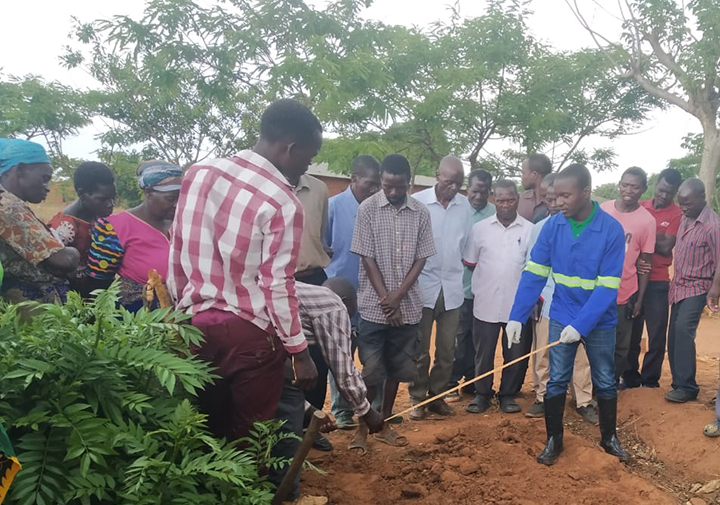
The F2F program has field offices in each of the four countries, where it has a large network of development partners, including USAID Mission-funded projects and the experience to organize trainings. As pandemic-era adaptation, the program started in 2021 to recruit in-country, local volunteers and connect them with U.S. experts to work together virtually.
The Peanut Innovation Lab’s expertise and Farmer-to-Farmer’s volunteer network allowed the two programs to work together for real impact. Here’s how it works: F2F recruits local volunteers, who take Groundnut Academy courses online, and then train farmers, in part using Innovation Lab digital and print products.
The Innovation Lab then makes experts (often Deputy Director Jamie Rhoads) available to conduct Q&A sessions with volunteers, who ask for clarity on what they learned in Groundnut Academy courses and bring forward farmer questions and experiences. These sessions involve local volunteers from different Southern African countries, facilitating across-the-country experience-sharing, as well as providing the Innovation Lab with anecdotal information about problems in the field or confusion over best management practices. This feedback helps the Peanut Innovation Lab to shape future research and outreach.
Early in the season in October and November 2021, F2F conducted 18 farmer trainings in the four countries – Malawi, Mozambique, Zambia, and Zimbabwe – covering all aspects of groundnut production, from planting to crop management to harvest. A second round of trainings were held in May and June 2022, just before groundnut harvest, so that farmers could learn about ways to reduce aflatoxin during the upcoming harvest and storage. Those 39 sessions were held in the same four countries.
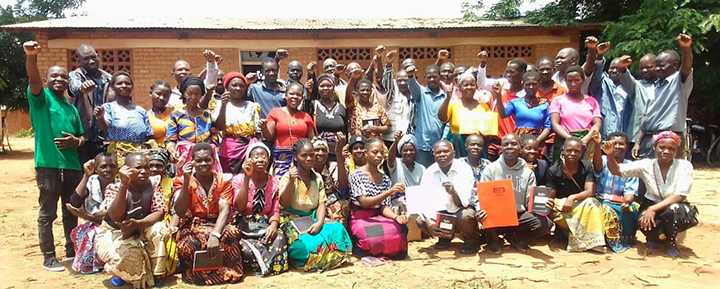
Farmers showed up at the trainings with great enthusiasm, in numbers beyond expectations, and were quick to adopt new practices.
“What was so far adopted was early ploughing and purchase of seed dressing. The farmers learnt about seed dressing during the trainings; 150 of the farmers from the two wards purchased seed dressing and are going to seed dress their seed for the first (time) in life,” said Rudo Mushangwe, F2F partner in Zimbabwe and field officer for USAID’s Fostering Agribusiness for Resilient Markets (FARM) project.
While increasing production was important to farmers, they also appreciated learning about aflatoxin.
“One thing I did not know that I learned was causes of aflatoxin and the long-term effect on human health if consumed,” said Leya Lungu, 34, a farmer and training participant from Nyachilala Cooperative in Zambia’s Petauke district. “As a family, we always selected the bad groundnuts for consumption and sold the good ones. It is interesting that as producers, we chose to poison ourselves and sell the good quality groundnuts to people who do not even produce them.”
Chomba Mubanga, 29, a local volunteer and Technical Officer at Ministry of Agriculture, at Chipata District, Zambia’s Eastern Province, echoed the importance of learning about aflatoxin. “For me what stood out most is the fact that I got to learn more about the impacts of aflatoxin as I had very little knowledge about it and didn't know that it can lead to death. One interesting aspect was that aflatoxins are actually odorless and tasteless, that was new to me because each time I ate a groundnut which tasted bitter, I associated that to aflatoxins.”
In all, 30 local volunteers took the Groundnut Academy’s Production and/or Aflatoxin courses (some volunteers taught in multiple trainings) and received a certificate as acknowledgement.
With the support of the Peanut Innovation Lab and Farmer2Farmer, the volunteers felt prepared to conduct training.
“I enjoyed the whole process, the training, the Q&A with Jamie and the interaction with volunteers from Zambia and Malawi. It showed that the challenges we face with the farmers were similar so sharing experiences was good,” said Inonge Simalumba, 33, a local volunteer and a Camp Extension Officer at Zambia’s Ministry of Agriculture. “With the information we got from the Peanut Innovation Lab, it was very easy to train, and we were confident that whatever issues the farmers would bring up, we would get a response. My biggest take away was that I could access all the materials I needed for future trainings from the Groundnut Academy website.”
Some of the local volunteers’ work went beyond conducting training sessions.. For example, Mugove Gora from Zimbabwe helped farmers belonging to Murwira association in Bikita district of Masvingo province to revive their commodity group which had been abandoned during COVID-19, by assisting them to develop a budget for buying seed for the 2022-2023 rainy season, which they have now done. In Zambia’s Eastern Province, the local volunteers Chomba Mubanga and Emmanuel Phiri facilitated a linkage between the farmers and an agrodealer so that they could access quality inputs on credit. As a result, 64 farmers in Petauke district accessed improved groundnut seed as well as fertilizer from Rimbecks Agro Dealers to increase production and improve quality of produce.
The Mission-funded USAID projects participated as partners particularly in Zimbabwe, where the Fostering Agribusiness for Resilient Markets (FARM) project facilitated trainings on aflatoxin with 14 farmer groups.
The training offered a particular benefit in Zimbabwe, according to FARM field officer Harmony Marwa.
“Peanut production in the smallholder sector has been on a steady decline as processers raise concerns on the high aflatoxin levels with the local crop. This training is the first step in reviving this important value chain as farmers then can meet the stringent quality requirements,” Marwa said. “The 14 groups are looking forward to have better quality produce this season. FARM is also assisting with market linkages, and we would be glad to share a bigger success story next year.”
“The Peanut IL was excited to find an innovative way to partner with Southern Africa F2F program through the Groundnut Academy. Working directly with the volunteers has been a great way to get immediate feedback on the content of the courses and helped us expand the reach of our extension tools, like the SAWBO animations and infographics. In some cases, we’ve even identified areas of needed research directly from farmers who are looking for answers to challenges we hadn’t considered,” Rhoads said.
Collaboration between the Southern Africa F2F and the Peanut Innovation Lab will continue during the 2022-2023 rainy season, increasing

